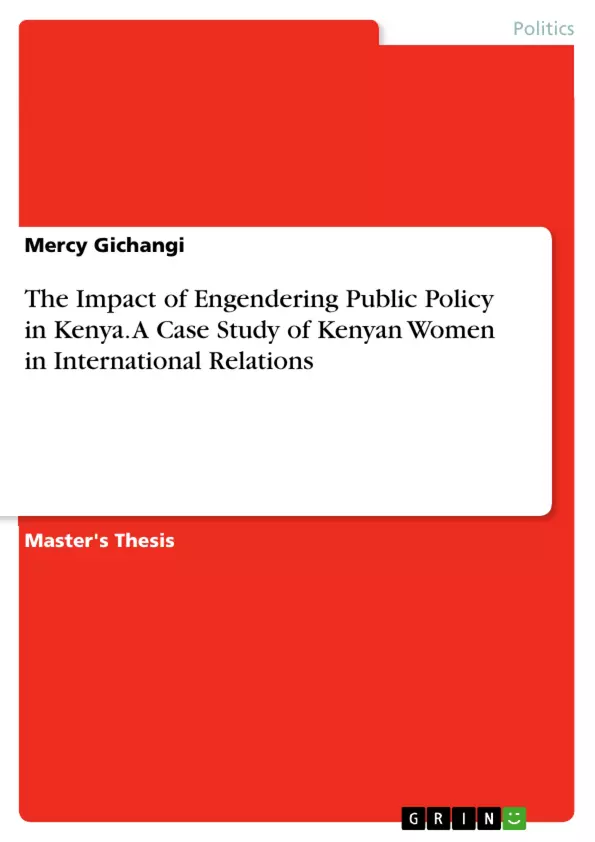This study sought to examine the impact of engendering public policy in Kenya and studied Kenyan women in international relations in the eyes of those serving in international jurisdiction and those in the local sphere who have been able to influence international public policy.
The Methodology of research was through both primary and secondary data analysis. Primary data was collected from interviews with women in public offices locally and internationally. The interviews were personal interviews in the form of Non-Scheduled Non-Structured interviews. The study relied heavily on secondary data which was collected from various sources such as library research, internet searches, past thesis, academic papers and dissertations, summary of journals, government documents.
Political scientists around the world have been generally surprised by the recent surfacing of a viable advocacy movement stemming from the women’s rights movement. The profession as a whole has found itself hard pressed to deal with the movement, either in analyzing the factors that provoked its emergence, or in explaining its implications for policy-making and the operation of public institutions in general. Such unpreparedness can be partially explained by the focus of public policy research, which has almost excluded women from its concern. The question then becomes ‘If your party nominated a woman for president, would you vote for her if she were to qualify for the job?’
The equality of men in the matter of public and political rights is established by a large number of constitutions, codes and laws. Many nations have adopted the system of representative government at a later juncture, and whose customs and traditions maintain women in a subordinate position, have adopted the principle of the equality of both sexes; in the Far East and in Islamic countries, this improvement in legal status of women is proceeding, indeed at a revolutionary pace. In the Far East the public emancipation of women has encountered very strong opposition in circles attached to traditions, whether religious or not.
Inhaltsverzeichnis (Table of Contents)
- DEDICATION
- ACKNOWLEDGEMENT
- LIST OF ACRONYMS
- ABSTRACT
- CHAPTER ONE: INTRODUCTION
- 1.1 Background of the study
- 1.2 Statement of the problem
- 1.3 Objectives of the study
- 1.4 Research questions
- 1.5 Significance of the study
- 1.6 Scope of the study
- 1.7 Limitations of the study
- 1.8 Definition of key terms
- CHAPTER TWO: LITERATURE REVIEW
- 2.1 International Legal Framework
- 2.2 African Legal Framework
- 2.3 Kenyan Legal Framework
- 2.4 The Impact of Engendering Public Policy
- CHAPTER THREE: METHODOLOGY
- 3.1 Research Design
- 3.2 Population and sample
- 3.3 Data Collection Methods
- 3.4 Data Analysis
- CHAPTER FOUR: FINDINGS AND DISCUSSION
- 4.1 Kenyan Women in International Relations
- 4.2 Impact of Engendering Public Policy
- CHAPTER FIVE: CONCLUSIONS AND RECOMMENDATIONS
- 5.1 Conclusions
- 5.2 Recommendations
- BIBLIOGRAPHY
Zielsetzung und Themenschwerpunkte (Objectives and Key Themes)
This research project aims to analyze the impact of engendering public policy in Kenya, particularly focusing on the role of Kenyan women in international relations. It examines how women's participation in public office and international policy-making has been influenced by the process of integrating gender considerations into policy development.
- The impact of gender mainstreaming in public policy on women's representation in public office
- The role of Kenyan women in international relations and their influence on public policy
- The challenges and opportunities faced by Kenyan women in navigating international spheres
- The legal framework governing gender equality and women's rights in Kenya and its implications for public policy
- The impact of social and structural barriers on women's participation in public life
Zusammenfassung der Kapitel (Chapter Summaries)
Chapter One: Introduction provides an overview of the study's background, statement of the problem, objectives, research questions, significance, scope, limitations, and definitions of key terms.
Chapter Two: Literature Review explores the international, African, and Kenyan legal frameworks relevant to gender equality and women's rights. It examines the existing literature on the impact of engendering public policy and the experiences of women in international relations.
Chapter Three: Methodology outlines the research design, population and sample, data collection methods, and data analysis techniques employed in the study. It details the approach taken to gather primary and secondary data through interviews and document review.
Chapter Four: Findings and Discussion presents the key findings of the study and discusses their implications. It examines the experiences of Kenyan women in international relations and analyzes the impact of engendering public policy on their participation and influence.
Schlüsselwörter (Keywords)
This research focuses on the impact of engendering public policy in Kenya, particularly on Kenyan women in international relations. Key themes include gender mainstreaming, women's representation, public policy, international relations, legal frameworks, social and structural barriers, and women's rights.
Frequently Asked Questions
What is the focus of this study on Kenyan public policy?
The study examines the impact of integrating gender considerations (engendering) into public policy in Kenya, specifically focusing on women's roles in international relations.
How was the data for this research collected?
The researcher used both primary data (interviews with women in public offices) and secondary data (academic papers, government documents, and international legal frameworks).
What legal frameworks are analyzed in the study?
The research reviews the Kenyan legal framework alongside African and international legal structures governing gender equality and women's rights.
What are the key challenges identified for Kenyan women in international relations?
The study explores social and structural barriers, traditions in Far Eastern and Islamic countries, and the general exclusion of women from traditional public policy research.
Does the study address the process of gender mainstreaming?
Yes, it analyzes the impact of gender mainstreaming on women's representation in public office and their influence on international policy-making.
- Quote paper
- Mercy Gichangi (Author), 2009, The Impact of Engendering Public Policy in Kenya. A Case Study of Kenyan Women in International Relations, Munich, GRIN Verlag, https://www.grin.com/document/1387431



